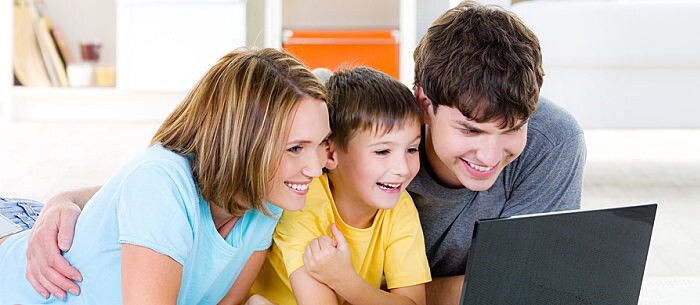Your children are a part of the technology generation. You may be able to keep them occupied with real world activities for a while, but the reality is that they will spend a lot of time in front of screens. Surfing the internet and checking social media on a variety of devices is such a big part of their lives. It is therefore important that both you and they have a proper understanding of internet safety for kids.
Here are a few tips to get you started:
Be Your Children’s Friend on Social Media Sites
Make sure you are ‘friends’ with your children on social media sites (Facebook, Twitter, Instagram, Pinterest etc) so you can see what they post and who they communicate with. However, don’t do this under a false identity – or you won’t be able to talk to them about the dangers of adding people they don’t know! It’s important to do this out in the open, explaining to your children that they can’t go on social sites without being connected with you first.
Too often, children will post things without thinking of the long-term consequences. So, after being connected you, they’ll understand the rule “Don’t post it if you wouldn’t want Mum and Dad to see it”. Remember, you’re responsible for your children until they reach 18, so being informed about what they’re doing in cyberspace is just another step in good parenting.
Discuss What’s Acceptable to Post — and What’s Not
Many children live in the moment and don’t realise that what they post in public stays there forever. Have a discussion with your children about appropriate photos and posts, and how words and pictures can be misconstrued and even hurtful to others. Explain what’s appropriate to share — nonpersonal observations, friendly joking — what’s not appropriate — photos that you wouldn’t want your grandparents to see, mean comments about friends or anyone else — and why. Point out to your children that a photo meant for one friend might be shared publicly. Remind them to ask themselves, every time they write an email, “What if I sent this to the wrong person? Would it be embarrassing or harmful?” If yes, hit delete.
Keep Computers (and Screens) in Family Areas
Encourage internet safety for kids by only allowing iPhones, iPads, computers and other devices in public areas of your home, like the kitchen or living room. This way you can see exactly what web pages your children are looking at, the types of online games they’re playing and any private chats they’re having. Keeping online devices in plain sight encourages responsible online etiquette.
Create a Plan
Together, you and your children should create a plan of dos and don’ts. It’s important that they feel like they’re a vital part of the conversation — and they’re more likely to follow the plan if they helped create it. Some things to cover include having your child:
- Not accept friend invitations or follow requests from people you don’t know.
- Avoid all chat rooms unless they have run them by you.
- Not give out any specific information to anyone online, even a friend. This includes address, school name, phone number, credit card and social security numbers.
- Don’t give out details about your family.
- Let you know if someone is making them feel uncomfortable online, either through cyberbullying or sending inappropriate photos or posts.
- Don’t forget to talk about what the family consequences would be for deliberately not following the rules. Perhaps your child would lose access to their device for a set amount of time. Be sure to also let your child know that if they feel threatened by a stranger online, that’s an appropriate time to contact the police.
Talk to Your Children Offline
Unplug and engage with your children. If your children see you constantly on your computer, checking social media or surfing the Web, they’ll follow suit. Instead, put down the devices and have real conversations with your children — about what’s happening at school, in after-school clubs, with sports and with their friends. Ask questions and keep the dialogue open. The key to having responsible children online is having responsible children offline.
